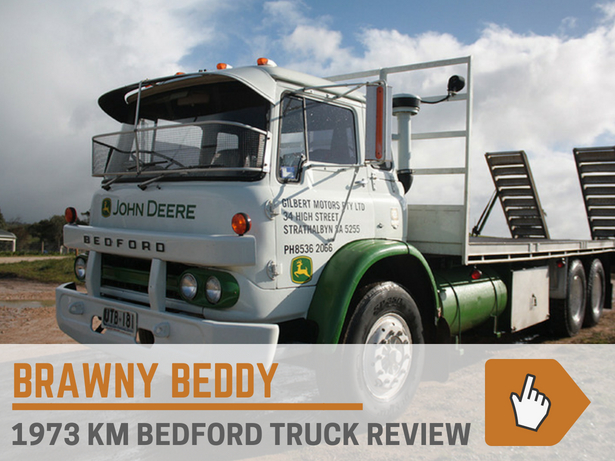In a punishing trip of a lifetime, Matt Wood takes the humble Renault Kangoo across Australia from east to west
Things People Said
-
Webby, Cunnamulla, QLD: “What sort of bloody vehicle is that?!”
-
Stockman, Quilpie, QLD: “Is that a Kia or something??”
-
Roadhouse attendant, Warburton, WA: “Geez you’re bloody keen!”
-
Gregor, Brisbane, QLD: “It looks like a mobile turd.”
Windorah bakes under the November sun as I roll into town. At this time of year, no tourists ply the streets of this little Western Queensland hamlet, which at last count was home to just 116 people.
As I roll down the deserted street, I can hear the buzzing of flies and the thump of dog tails on verandahs, shooing them away as they pant in the heat. The chirp of a siren is startling, shattering the silence. I look in the rear-vision mirror; the local cop wants a chat.
Blow In The Bag
He climbs out of the Landcruiser, looks at my vehicle, and then looks at me. “Where’re you off to?” he asks. “Heading to Boulia today, mate,” I reply. His eyes narrow, looking back at my ride. “I’ll get you to blow into this, please,” he says, holding out a breathalyser.
You can’t blame him for questioning my sobriety – or my sanity. I’m standing beside an unlikely outback tourer. My ride is a metallic brown Renault Kangoo Maxi Crew.
This little bug-eyed delivery van may look at home in the narrow back streets of a major capital city but, out here in the heart of the Channel Country, it stands out like the dog’s proverbials.
After convincing the police officer that I’m indeed sober, he embarks on a line of questioning to assess my state of mind. After all, I’m about to tackle the first stretch of outback dirt of this trip – about 350 kilometres of it. Satisfied that I have enough food and water on board, as well as a sat phone, the officer leaves me with some advice. “The first half of that road seems okay, not sure about the rest. Have a safe trip.” He says this in a way that indicates he is expecting to see me again soon.
It then occurred to me that Renault Australia provided me with a vehicle that would blend into the outback scrub perfectly. Clearly, if things went pear shaped, they were making sure that I wasn’t going to be found alive to talk about it. Sneaky.
 |
|
The Pacific Ocean from Cape Byron, the easternmost point of Australia
|
Trans-Continental
The obvious question here is, of course, why? Well, I was attempting to cross Australia from Byron Bay NSW, Australia’s easternmost point to Shark Bay WA, the continent’s westernmost point. To be precise, Steep Point is the westernmost point but it’s 4×4 only amongst the sand dunes. However, I was still game to see just how close I could get.
I wanted to see if this unassuming little van had the gumption to take on a massive outback journey. My route was to take in parts of the famed Outback Way through the heart of some of the most remote parts of Australia – a journey most would only tackle in a well-equipped 4×4.
From Byron Bay a couple of days prior, I’d wound my way through the border ranges and across to Goondiwindi on the Queensland border. From here, the little van and I passed through St George, Cunnamulla and Eulo before hitting Australia’s longest road: the Diamantina Development Road.
My confidence in the Kangoo and its little 81kW (109hp)/250Nm 1.5-litre diesel power plant was starting to grow as the irrigation country gave way to outback scrub and cattle grids. The Renault had surprisingly long legs and cruised the blacktop highway with ease.
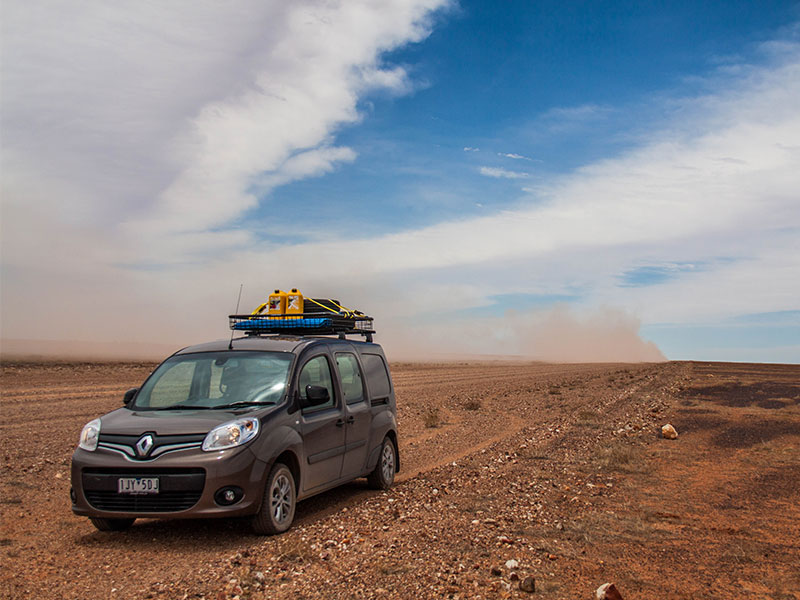 |
|
The Barcoo bakes under the late Spring sun
|
Stock As A Rock
The van was as close to showroom spec as you could get. The only modification to this van was a cargo basket on the dealer-fit roof racks. This was to carry three spare tyres and two jerry cans of fuel. A cargo barrier was also fitted behind the front seats and the back seats were folded down. It was even sporting the factory-fit Continental 195/65R HXL rubber.
Stowed inside the four-cubic-metre cargo area was a 45-litre Engel fridge-freezer combo, a 153-litre Engel cool box, a swag, 60 litres of water, enough food for seven days, a stove, tools, compressor and some recovery gear. Payload wise, this was nowhere near the 830kg capacity of the Kangoo, but there were at least a couple of hundred kilos of gear sitting on the floor of the van.
It’s worth mentioning that I’m neither encouraging nor even recommending that people should take a low-clearance front-wheel drive 4×2 van into the outback. This was purely an exercise based around testing the durability of the Renault driveline and the build quality. Added to this was my own sentimental yearning for events of yesteryear, like the Redex Reliability Trials of the 1950s, which coincidentally saw more than a couple of Renaults take part in and even win.
For a trip that was going to take in more than 1500km of hard dirt, rock and gravel road, as well as some long days in the saddle, it was also going to be a chance to experience first-hand the ergonomics of the budget-priced parcel hauler.
Black Top To Desert Dirt
The thin strip of asphalt grew thinner as the channel country gave way to barren plains strewn with rock and scrub. The endless plains were marred only by the stark outcrops of flat-topped buttes thrusting towards the wide-open sky. Then, abruptly, the blacktop gave way to dirt.
I’d barely gone 100m before I thought I was in trouble. A metallic rattle erupted from one of the rear wheels. I rolled to a stop and inspected. I needn’t have worried – it turned out to be a small rock rolling around the inside of the alloy rim and bouncing off the brake caliper guard. I dropped a little air out of the tyres to make the ride a little smoother and hit the road again as the mercury soared into the high 30s.
Sand dunes shimmered in the heat haze as the bronze van baked under the sun. Thankfully the climate control was working a treat. The R-Link multimedia system was also doing a good job of keeping me entertained. More than one tragic rendition of Cold Chisel’s greatest hits was belted out as the Kangoo left a trail of pale dust playing in the sunlight behind it.
Boulia, Queensland, is home to the famed Min Min lights; ghostly lights that appear at night and seem to travel and hover in the distance. I made camp on the banks of a dry creek with big expectations of supernatural apparitions. Clearly the aliens weren’t interested in me because I didn’t see a bloody thing.
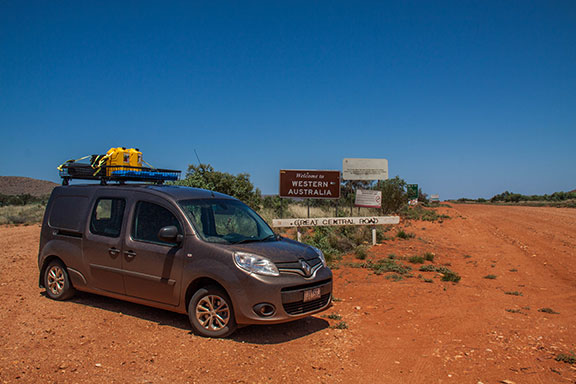 |
|
At the WA/NT border near Docker River
|
Off The Beaten Track
From Boulia, I was heading to Mt Isa before setting off across the Barkly tablelands and into the Northern Territory. My route was going to take me to Alice Springs, Uluru and then onto the biggest test of the trip, the Great Central Road. The unsealed and remote 1150km Great Central Road runs from Uluru to Docker River and into Western Australia. From the West Australian town of Laverton I would then head northwest through the gold fields to Mt Magnet, and then to Denham on the shores of Shark Bay.
Once into the NT, I was able to prod the Kangoo a little more and nudge it up to the 130km/h speed limit. Given its European origins, it’s probably no surprise that the little van handled this speed with ease. The extra drag and weight on the roof caused by the load up top made it feel a little twitchy, but I happily buzzed through the heat haze, eating up the miles as the sun sunk low in the west.
Fuel economy was also pretty good. Up until this point, I’d been averaging about 8L/100km. The extra speed saw fuel consumption rise to 8.5L/100km, which, considering the conditions and the load, is pretty darned cheap motoring!
I was starting to feel a little admiration for the little van by the time I arrived in Alice Springs. I was now halfway across the country and the Renault hadn’t missed a beat. More importantly, I was still walking upright. The Kangoo is extremely comfortable over long distances. I already notched up a couple of 10-hour days behind the wheel with no aches and pains.
Unfortunately, someone in Alice Springs thought they’d smash one of the back windows for a look inside overnight. However, a local windscreen repair mob was able to make a passable replacement out of 2mm perspex, which was just as well because there was still a lot of dusty ground to cover.
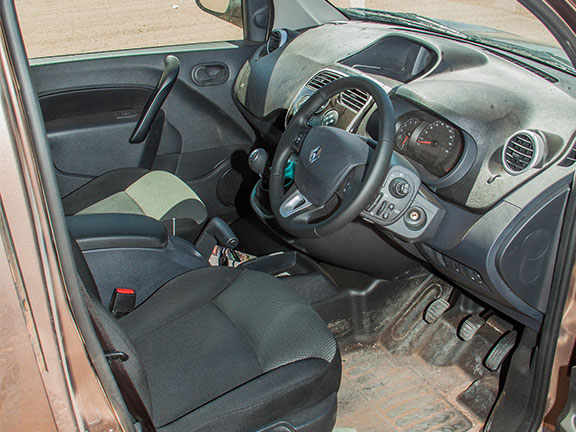 |
|
The Kangoo cockpit proved to be an extremely comfortable office for long days on the road
|
Cruiser Country
I’d grown used to the incongruity of the Kangoo out here amongst the Toyota Landcruisers and HiLuxes. However, as I took some time to walk around the base of Uluru, I couldn’t help but be taken by the sight of the somewhat funny-looking, dust-covered van parked amongst the salt bush and desert oak with the red monolithic rock reflected in its windscreen.
The Great Central Road lulled me into a false sense of security as Kata Tjuta slowly faded in my rear-vision mirrors. However, the freshly graded road soon gave way to gravel-strewn corrugations and washouts. Fist-sized rocks lurked amongst the rutted dirt, waiting to smash a rim or, even worse, smash a hole in the side of the transmission, sump or fuel tank. I was loathe to drop the tyre pressures too much as the Kangoo doesn’t have much ground clearance for this kind of terrain.
It was out here, negotiating the punishing road surface, that I was starting to question the wisdom of this trip. The road slices through the southern parts of the Gibson Desert and I hadn’t seen another car or person all day. The only wildlife I’d seen lay panting in the shade watching as I passed. I could feel the judgment in their passive gaze. Even the roos thought I was bonkers.
If any vital part of the Kangoo failed out here, I was going to be staying put for a very long time. I was also concerned about animal strikes; the unprotected front of the Renault seemed to be a magnet for animals hellbent on destroying both themselves and the Kangoo. Between roos, eagles and feral goats, my eyeballs were out on stalks scanning the edges of the roads. Needless to say, I only travelled during daylight hours.
Warning Light
But the Kangoo kept on humming. I pushed on from Warburton to Laverton and back to sealed roads. A stray rock must have taken out a wheel sensor for the Renault’s Electronic Stability Control, as a warning light came up on the dash board to let me know that there was an issue. However, this was the only fault to come up and I was able to keep on trucking.
Again, I was amazed at how well the Kangoo held up on the 1150km-long Central Road. I was sure that the punishing conditions would elicit some sort of rattle or squeak. To be honest, I was expecting some stuff to stop working. But the Renault stayed as tight as a drum. The inner guards and under-body plastics, however, told the real story. The front inner guards developed a tendency to come adrift with vibration, and plastics inside the rear wheel arches looked as if they’d been chewed by a bored Kelpie sheepdog after being pummeled for hours on end by rocks and gravel.
From Laverton, the little brown beastie kept on chugging north as the scenery took on the rocky red hue of the northern goldfields. The route was now dominated by hulking four-trailer road trains hauling ore and flag-wearing mine support vehicles scurrying between mine sites.
I walked into the pub in Mt Magnet and was greeted by a sea of humanity clad in hi-vis. I ordered a beer and quipped a bit too loudly, “I seem to be a little underdressed!” I was greeted with a bemused grunt from the bartender as, all of a sudden, the conversation around me stopped. If there had been a piano playing in the corner it would have stopped. In the name of self-preservation, I retreated to a deserted corner of the beer garden.
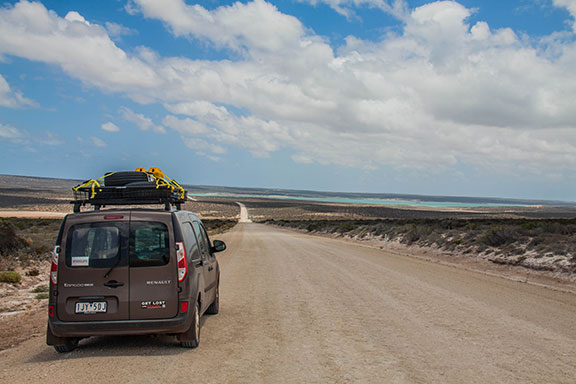 |
|
After 7400km of inland heat, the ocean beckons in the distance
|
The Coast
I lit out for the coast the next morning. A few hours down the road, the scrub seemed to abruptly disappear to be replaced by the almost surreal sight of sand dunes protruding through wheat crops ready for harvest. The closer I got to the coastal highway, I saw more and more headers madly thrashing away at the thin stubble shrouded in dust.
I’d left the Pacific Ocean behind two weeks earlier and, after the searing heat, desert and dust of the Australian interior, I was greeted by the welcome sight of the crystal blue Indian Ocean.
But my trip wasn’t over yet. I wanted to get the Kangoo as close to Steep Point as possible. The trip down the aptly named ‘Useless Loop Road’ threw up more challenges as the heavily corrugated road narrowed to a track, and then finally sand.
The malfunctioning traction control ended up being a blessing as, with reduced tyre pressure and some wheel slip, I was still able to make headway in the sand.
I crept through the dunes as they blared white in the midday sun and found myself confronted with a decision. The face of a wheel-rutted dune lay before me. I could attempt to climb it but, with no support vehicle, if I got stuck I was going to have to get myself out; there was little in the way of traffic out here.
I decided to back track and headed towards False Entrance. The spectacular azure of the ocean drew a stark line across the horizon. I parked at the entrance to the track onto the beach and took in the sight. Waves pounded the craggy cliffs and rolled up the white sand. It was then that I considered the trip. It was by no means a small feat for a little van that many would never consider taking out of the city, let alone take it this far – even if I had fallen just under 40 kilometres short of my proposed, yet possibly ill-conceived, goal.
Desert heat, punishing roads, rocks and kamikaze wildlife had all failed to stop the little Renault. It was a big effort on the vehicle’s part, and even I had to admit that these things are well put together.
As I rolled back towards Denaham, I had my first and only blowout, which in itself was pretty amazing. The well-bruised Contis had taken a battering and this one gave out when I struck an errant rock at a decent clip.
By the time I left the dusty, bug-splattered Kangoo at a yard in Geraldton, I covered 8000 kilometres of some of the toughest roads in Australia in the November outback heat. The Kangoo had not only proved durable and reliable, it also proved comfortable and frugal. The fuel average for the little diesel still stood at 8.5L/100km.
It was a mighty effort from an unexpected vehicle operating completely outside its comfort zone. It may not be the ultimate expedition platform but it’s a tougher customer than it appears on face value. We crossed Australia and I got thinking: what next? What other adventures could I tackle head on with just this little van? Maybe across the world? Siberia, here I come …
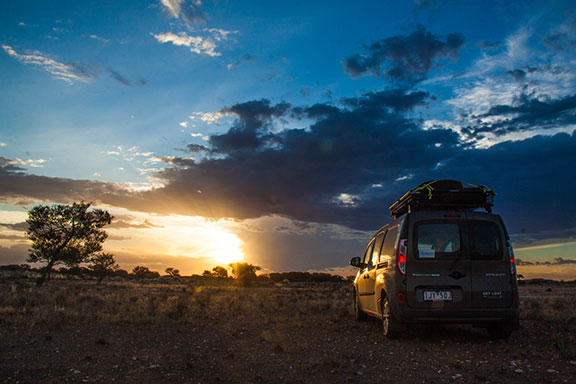 |
|
Sunset at Mt Magnet WA. It was here that the journey nearly ended after I opened my big mouth in the pub
|


